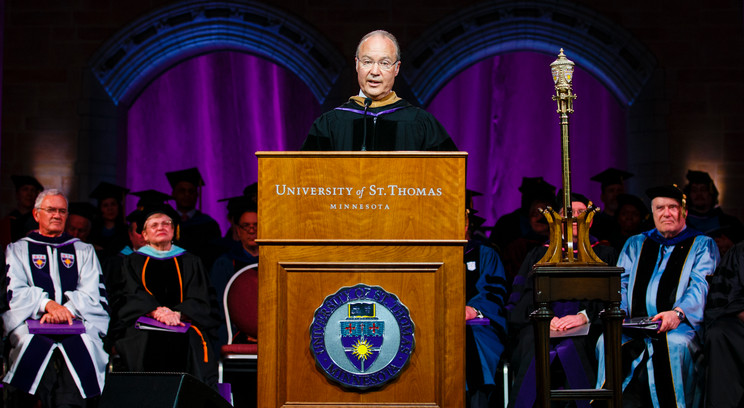Mark Rauenhorst, former chairman and CEO of Opus Corporation, knows what it takes to make it count in the world of business. Having led a successful commercial real estate empire and being involved in many community and industry organizations, Rauenhorst shared key insights about how to be impactful in one’s professional and personal life at the Opus College of Business Class of 2014 commencement ceremony.
Watch the address in the video above, starting at 17:40.
In his leadership position at Opus Corporation, Rauenhorst had extensive experience recruiting and hiring employees that would continue the company’s success and assimilate to the culture seamlessly. Rauenhorst shared that he specifically assessed four attributes when hiring new employees, and advised graduates to consider and practice these when interviewing with employers.
The least important (and perhaps most surprising) attribute on Rauenhorst’s list of key characteristics for new hires was an individual’s prior professional experience. Did they have transferrable skills, and some level of experience (not necessarily in the same industry) that would assist them on the job? Experience was important to Rauenhorst, but interestingly not the most critical factor in hiring a new team member, if his three other conditions were met.
The next consideration factor was relatability – did Rauenhorst genuinely like the person he was interviewing? Could the candidate relate to other team members, work collaboratively, and impress clients? Relationship management and strong interpersonal skills were integral to continuing to build the Opus Corporation’s client base and critical in identifying and closing new business opportunities. Rauenhorst advised OCB graduates to continue to build these important “softer” skills and reaffirmed their high marketability and importance to employers, as employees of a firm are its most visible brand ambassadors.
The second-runner up on Rauenhorst’s list important attributes to assess for new hires was smarts. To Rauenhorst, being smart was not necessarily measured by earning the highest GPA or graduating summa cum laude. A “smart” candidate was one who highlighted their ability to learn quickly on the job and be perceptive to both the internal business and external client environment. Smart individuals would be quick to adapt to new responsibilities, be proactive and motivated to meet client needs, and grow the business in key areas. Being a smart candidate equated to being a versatile employee who would be a contributor across many areas of the firm.
Finally, the most important hiring attribute on Rauenhorst’s list was trust. In his words, “If you can make someone feel that they can trust you, you will get the job.” Why was trust so important? Rauenhorst stated that a trustworthy employee was one that he knew would always look out for the best long-term interest of the organization and consistently make ethical business decisions. As such, in interviews he analyzed whether a candidate had the smarts, interpersonal skills, and experience to build trust and make responsible business decisions. Trust was indeed the paramount characteristic sought after in Rauenhorst’s hiring decisions, but in many ways, the fourth, third, and second-most important attributes on his list were key in building that trust, and ultimately extending a job offer.
So, what happens after one gets the job? Achieving work-life balance can be easier said than done, and Rauenhorst admitted he struggled with prioritizing business and personal matters in the past, particularly during the devastating commercial real estate market downturn in 2009. During times of stress, Mark turned to the words of wisdom from his late father, Gerry Rauenhorst, to help him focus and re-prioritize. The advice, again, was in the form of a simple list: faith first, family second, and career third. Rauenhorst advised OCB graduates to consider these guidelines, and that by doing so, they would never be disappointed personally or professionally.
Making a difference the job and in one’s personal life may the biggest challenge the Class of 2014 faces, but equipped with Rauenhorst’s advice, the relevance of an St. Thomas graduate business education, and skills to ‘think critically, act wisely, and work skillfully toward the common good,’ they are already well on their way to making it count in their careers and communities.
More than 200 students were hooded in the Graduate Business Commencement Ceremony on Saturday, May 24. Mark Rauenhorst, consultant and advisor of the Rauenhorst Trusts and Opus Holdings, delivered the commencement address. Rauenhorst’s family has a nearly 70-year association with St. Thomas dating to 1945 when his father, Gerald, enrolled as a freshman. Gerald Rauenhorst was one of the most influential trustees and generous benefactors in the history of the University of St. Thomas.







